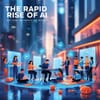Artificial intelligence is transforming the way we work and learn, bringing about rapid changes that require adaptability and new skill sets. AI tools like ChatGPT-4o, Notion AI, and GitHub Copilot are helping professionals automate tasks, generate content, and analyze data, increasing productivity and efficiency. However, AI is not just a tool for boosting productivity; it's also creating new job opportunities and changing the nature of work.
To stay relevant in an AI-driven workforce, individuals need to develop skills that complement AI, including critical thinking, creativity, emotional intelligence, and data analysis. While AI may displace some jobs, it's also creating new ones, such as AI training data specialists, AI ethicists, and AI-powered solution developers.
In education, AI-powered applications are offering tailored learning experiences, automating grading, and providing virtual tutoring, enhancing student engagement and knowledge retention. Educators are incorporating AI into their curricula, emphasizing skills like prompt engineering, data analysis, and critical thinking to prepare students for an AI-driven workforce.
Open-source platforms like Hugging Face and educational programs are democratizing access to AI tools and knowledge, enabling more people to develop AI skills. To thrive in an AI-driven world, individuals need to commit to continuous learning, upskilling, and reskilling to stay relevant.
Ultimately, AI is not a replacement for human workers, but rather a collaborative tool that can augment human capabilities and enhance productivity. As AI continues to evolve, it's essential to develop human skills like creativity, empathy, and complex problem-solving, which will become increasingly valuable in an AI-driven world.


